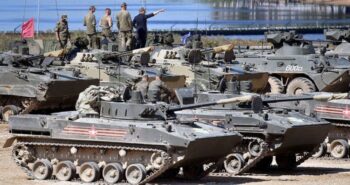By Hafed Al-Ghwell
The seventh anniversary of the Libyan uprising is approaching, and so it is worth taking a look at what happened then, what is happening now and what might happen next in a country that was shaken to its core and has since suffered years of upheaval despite its apparent advantages of relative wealth, a small population and a strategic location.
One must first ask what happened on Feb. 17, 2011. Was the uprising that toppled the regime of Col. Qaddafi inevitable?
Would it even have happened if the neighboring countries of Egypt and Tunisia had not experienced their own uprisings against the status quo?
To answer truthfully, one must acknowledge that Qaddafi had followed extreme foreign and domestic policies that turned Libya into an international pariah.
He made Libya an extreme socialist state, conflicting with the reality and history of the Libyan population, who saw themselves as impoverished despite the wealth of their country and similar Arab nations in the Gulf.
Yet, ask the average Libyan today and most will readily admit that the Qaddafi regime had changed dramatically since 2005, becoming less oppressive, more open to the West, and a more friendly environment for the private sector.
The regime even released many political prisoners, gave compensation for confiscating property in the late 1970s and early 1980s, and began serious efforts to reconcile with the political opposition in exile, many of whom returned to Libya safely.
The fiery Qaddafi seemed to have finally calmed down, opened his mind, and felt safe from the mostly imaginary Western plots after he settled his outstanding issues with the US over his support for terrorism and acquisition of weapons of mass destruction.
Seen in that light, it seems strange that an uprising should take place at this point, among a population who had waited patiently for almost 40 years for the worst of the Qaddafi regime to pass.
The lack of a clear answer as to why the uprising happened has given rise to a belief, at least in Libya, that the whole matter was orchestrated by France and even Qatar.
More specifically, that these countries took advantage of events in Egypt and Tunisia and championed the Libyan uprising in close coordination with Islamist radicals, who Qaddafi himself had released from jail and secured their return from exile.
The second issue is what is happening in the country today. Of course, it is hardly a secret how bad the situation in Libya is — the country is in freefall on many levels.
Law and order are almost non-existent, with hundreds of militias vying for control. With sporadic infighting, they continue to damage infrastructure, terrorize the population and cause collateral damage everywhere.
Kidnappings for political or tribal motives or for ransoms are daily occurrences. Some victims disappeared without a trace years ago, while others have been found murdered because their families could not afford the ransom demanded.
On the political level, the situation could not be worse, with several governments, the complete collapse of public services, and fragmentation along religious, political, tribal and regional lines.
These conditions have made it extremely difficult for the many United Nations envoys, including the current fifth delegate Ghassan Salama, and numerous representatives of the Arab League, African Union, European Union and the permanent members of the UN Security Council, to even come close to reaching a political agreement and plan to address their serious concerns over the past seven years.
Even after so many elections, and some initial internationally sanctioned political agreements, the country seems more divided than ever.
In daily life, Libyans contend with several central banks and governments, severe power cuts and water shortages, deep cash and liquidity problems causing long lines at the banks, and, ironically, fuel shortages in one of the world’s major oil and gas exporters.
Considering the third question, the most likely scenario of what will happen next is a continuation of the current chaos and fragmentation into the foreseeable future.
Yes, there will be some basic agreements and, yes, there will be new elections, but these will simply be bubbles on the surface of a country deeply divided by, to some extent, irreconcilable differences.
These arise from a basic reality that neither the international community nor Libyans themselves recognized in 2011: That the uprising was, in fact, a civil war between those who supported and those who opposed Qaddafi, which has descended into the infighting we see today.
Failing to recognize it as a civil war at the time, no one bothered to develop a post-conflict plan to disarm and integrate fighters and initiate the peaceful reconciliation efforts that must follow any civil armed conflict.
Also, the nature of the uprising, and the foreign military and political backing involved, created an environment of blind, widespread revenge, leading to a cycle of counter-hate and vengeance.
All of this adds up to a simple conclusion: The Feb. 17 uprising in Libya failed miserably to take what was good in the Qaddafi regime and build on it, and correct what was wrong.
It simply completely ripped out any gains Libya had achieved since its independence in 1952 and made the country the first in the world ruled by all shades of armed gangs; political, tribal, and criminal.
***
Hafed Al-Ghwell is a former adviser to the board of directors at the World Bank Group.
____________




